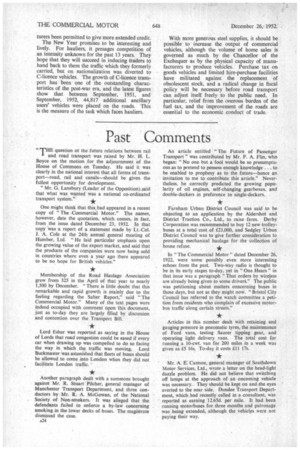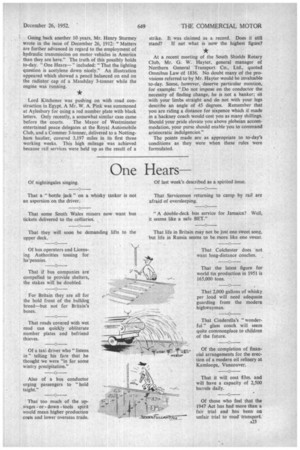Past Comments
Page 26

Page 27

If you've noticed an error in this article please click here to report it so we can fix it.
" THE question of the future relations between rail
and road transport was raised by Mr. H. L. Boyce on the motion for the adjournment Of the House of Commons on Tuesday. He said it was clearly in the national interest that all forms of transport—road, rail and canals—should be given the fullest opportunity for development.
"Mr. G. Lansbury (Leader of the Opposition)..said that what was wanted was a national co-ordinated transport system."
One might think that this, had appeared in a recent copy of "The Commercial Motor." The names, however, date the quotation, which comes, in fact, from the issue dated December 23, 1932. In that copy was a report of a statement made by Lt.-Col. J. A. Cole at the 24th annual general meeting of Humber, Ltd. "He laid particular emphasis upon the growing value of the export market, and said that the products of the companies were now being sold in countries where even a year ago there appeared to be no hope for British vehicles."
Membership of the Road Haulage Association grew from 325 in the April of that year to nearly 1,500 by December. "There is little doubt that this remarkable and rapid growth is mainly due to the feeling regarding the Salter Report," said "The Commercial Motor." Many of the text pages were indeed occupied with comment upon this document, just as to-day they are largely filled by discussion and contention over the Transport Bill.
Lord Esher was reported as saying in the House of Lords that road congestion could be eased if every car when drawing up was compelled to do so facing the way in which the traffic was moving. Lord Buckmaster was astonished that fleets of buses should be allowed to come into London when they did not facilitate London traffic.
Another paragraph dealt with a summons brought against Mr. R. Stuart Pitcher, general manager of Manchester Transport Department, and three conductors by Mr. R. A. McGowan, of the National Society of Non-smokers. It was alleged that the defendants failed to enforce a by-law concerning smoking in the lower decks of buses. The magistrate dismissed the case.
A24 An article entitled "The Future of Passenger Transport" was contributed by Mr. F. A. Flin, who began: "No one but a fool would be so presumptuous as to pretend to possess enough knowledge. .. to be enabled to prophesy as to the future—hence an invitation to me to contribute this article." Nevertheless, he correctly predicted the growing popularity of oil engines, self-changing gearboxes, and double-deckers in preference to single-deckers.
Farnham Urban District Council was said to be objecting to an application by the Aldershot and District Traction Co., Ltd., to raise fares. Derby Corporation was recommended to buy 12 new trolleybuses at a total cost of £21,000, and Sedgley Urban District Council was to give further consideration to providing mechanical haulage for the collection of house refuse.
In "The Commercial Motor" dated December 26, 1922, were some possibly even more interesting echoes from the past. Two-way radio is thought to be in its early stages to-day, yet in "One Hears" in that issue was a paragraph "That orders by wireless are already being given to some drivers." The public was petitioning about matters concerning buses in those days, but not as they might now. "Bristol City Council has referred to the watch committee a petition from residents who complain of excessive motorbus traffic along certain streets."
Articles in this number dealt with retaining and gauging pressure in pneumatic tyres, the maintenance of Ford vans, testing Saurer tipping gear, and operating light delivery vans. The total cost for running a 10-cwt. van for 200 miles in a week was given as £5 16s. To-day it costs £11 17s.
Mr. A. E Cannon, general manager of Southdown Motor Services, Ltd, wrote a letter on the head-light dazzle problem. He did not believe that switching off lamps at the approach of an oncoming vehicle was necessary. They should be kept on and the eyes averted to the near side. Dundee Transport Department, which had recently called in a consultant, was reported as earning 12.65d. per mile. It had been running motorbuses for three months and patronage was being extended, although the vehicles were not paying their way. Going back another 10 years, Mr. Henry Sturmey wrote in the issue of December 26, 1912: "Matters are further advanced in regard to the employment of hydraulic transmission on motor vehicles in America than they are here." The truth of this possibly holds to-day. "One Hears—" included: "That the lighting question is acetylene down nicely." An illustration appeared which showed a pencil balanced on end on the radiator cap of a Maudslay 3-tonner while the engine was running.
Lord Kitchener was pushing on with road construction in Egypt. A Mr. W. A. Pink was summoned at Aylesbury for using a red number plate with black letters. Only recently, a somewhat similar case came before the courts. The Mayor of Westminster entertained peace delegates at the Royal Automobile Club, and a Commer 3-tonner, delivered to a Nottingham haulier, covered 3,197 miles in its first three working weeks. This high mileage was achieved because rail services were held up as the result of a strike. It was claimed as a record. Does it still stand? If not what is now the highest figure?
At a recent meeting of the South Shields Rotary Club, Mr. G. W. Hayter, general manager of Northern General Transport Co., Ltd., quoted Omnibus Law Of 1836. No doubt many of the provisions referred to. by Mr. Hayter would be invaluable to-day. Some, however, deserve particular mention, for example: "Do not impose on the conductor the necessity of finding change, he is not a banker; sit with your limbs straight and do not with your legs describe an angle of 45 degrees. Remember that you are riding a distance for sixpence which if made in a hackney coach would cost you as many shillings. Should your pride elevate you above plebeian accommodation, your purse should enable you to command aristocratic indulgencies."
The points made are as appropriate to to-day's conditions as they were when these rules were formulated.












































































